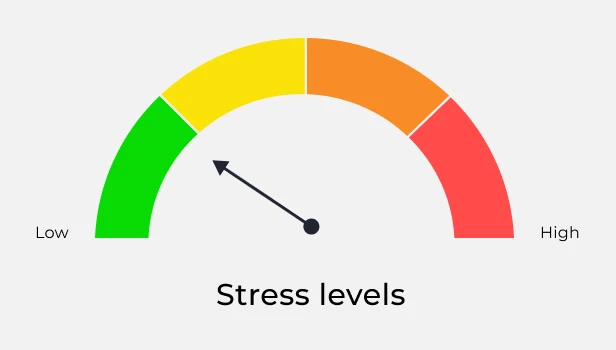Stress
- Aoife Hickey, Senior Clinical Psychologist | Corrine McCabe, Trainee Clinical Psychologist
- 8 minute read
- Last updated: July 2023
Stress happens when you don’t feel able to deal with problems or pressure. Repeated, long-term or severe stress is linked to health problems. It's important to get stress under control.

Stress levels can be high for both you and your family following your stroke, but stress typically reduces over the course of the first year.
What is stress?
Stress is the body’s way of responding to threat or pressure. It makes you feel like you are overwhelmed. Stress can come from illness, work, family, your living situation or not having something you need. Even positive events can be stressful, like starting a new job or going on holiday. Stress can be short-lived and pass very quickly, or it can last a long time.
The body responds to being in danger with the “fight or flight” response. Stress hormones quickly increase your energy, so you can escape the situation or take on the challenge.
Some stress can be positive. It can improve your focus and motivate you. Think about studying for an exam – stress can help you perform at your best. Long-term stress is less helpful.
How you cope with stress depends on a number of different things. For example, you might view stress as helpful or motivating, or you could find it overwhelming. Your past experiences of stress and how much control you have over the situation also make a difference. After a stroke, some people find it harder to manage stress.
Stress-busting tips

-
Get a good night’s sleep. Try to get seven to nine hours of uninterrupted sleep every night.
-
Get regular exercise. Exercise helps use up some of your nervous energy and releases feel-good endorphins.
-
Eat a healthy diet. Don’t rely on junk foods, overeating, alcohol or smoking to manage stress.
Make time to socialise with friends or family. A support network can help you relax, reduce stress and see things in a different light. Talking through solutions to problems can help too.
Taking a direct approach to solving problems (as opposed to avoiding problems) seems helpful. Ask yourself, “What's causing this feeling?”. There are five steps to actively solving problems:
- Define the problem. When does it happen? Where? Who is involved? Write the answers down. If there is more than one problem, separate them and deal with them individually.
- Generate as many solutions as you can think of. Even if solutions seem silly and unworkable, include them.
- Think about the implications of each of the solutions. What would be involved, exactly? Is it likely to be effective? What are the pros and cons of each?
- Choose the best solution and decide to act.
- Review what happened and weigh up whether the solution was effective. If it didn’t work out as planned, consider what you could do differently next time.
Take control and get organised. Keep a diary of upcoming appointments. Make a list of what you need to do, prioritise what is most important and work through it. Leave the least important things until last.
If work is stressful, think about the parts of your job that make you most stressed. Too many tasks? Working long hours? Difficult relationships? Not having a sense of control over your work? If your workload feels out of control, talk to your manager about how much you can realistically take on. Flexible hours might help. Don’t work more than your hours. If you tend to put things off, set aside time in your diary to work on a looming task. It can be helpful to make your manager aware of your stroke.
Create a routine. Routine can help you maintain a sense of control over your day. Make sure to include time for things you enjoy, like time with friends and family or engaging with your hobbies and interests.
Relaxation can help calm the physical feelings of stress. Relaxation exercises can be broadly divided into breathing-focused exercises, muscle relaxation, visualisation techniques or meditation. Relaxation is best experienced as a practical exercise. Many audio recordings of relaxation exercises are available online. Some examples include:
Some examples include the Beaumont Mindfulness and Relaxation Centre, the Mater Wellbeing Centre or the Mindfulness and Compassion Centre.
Apps which focus on mindfulness or relaxation include Headspace, Calm and Medito. Medito is free to use. Headspace and Calm are subscription-based.
Recognising stress
When is stress a problem?
Moderate stress that does not last too long is not usually a problem, and it can sometimes be helpful. Intense stress which lasts a long time is less helpful. Stress may be a problem if you feel constantly overwhelmed, to the point that it interferes with your day-to-day activities.
Where can I get more help?
The HSE offers free stress management support. The Stress Control programme can be a useful place to start. This six-week online course is free, and you don’t need to register. It's based on cognitive behavioural therapy (CBT) principles.
If making lifestyle changes feels stressful, the HSE’s Living Well programme may work for you. It is for adults with at least one long-term health condition, such as stroke, and it's open to families or carers too. Over six weeks, workshops cover topics such as problem-solving, managing fatigue, exercise, relaxation, communication, healthy eating and managing medication.
Self-help books can also be useful. One example is Overcoming Stress.
If these don’t help you manage your stress, you should speak to your doctor or stroke nurse. They will be able to link you in with local support, such as your local HSE primary care team.
Other information
Frequently asked questions
There is no single technique that works for everyone – there are lots of approaches to relaxation. Take a curious approach. Try out different types of relaxation to find what works best for you. Some hospital websites have free relaxation exercises, such as the Beaumont Mindfulness and Relaxation Centre or the Mater Wellbeing Centre. Other free websites include the Mindfulness and Compassion Centre.
Apps which focus on mindfulness or relaxation include Headspace, Calm and Medito. Medito is free to use. Headspace and Calm are subscription-based.
Short-term and long-term stress seem to be linked to stroke. This includes stress at work or home, financial stress or recent stressful events. It's not fully understood how stress raises the risk of stroke.
Sudden, intense stress might raise the risk of stroke by triggering the sympathetic nervous system, narrowing the blood vessels and rupturing plaque in the arteries.
Long-term stress is thought to be linked to stroke through changes in how the sympathetic nervous system functions, hardening the arteries and narrowing the blood vessels.
When stressed, people often use unhealthy ways of coping, which might indirectly raise the risk of stroke. This can include overeating and eating junk foods, smoking, drinking more and being less active.
Stress and anxiety share some symptoms. This makes it hard to spot the difference. Stress usually happens in response to an event or situation and settles once the event is over or the problem has been dealt with. Anxiety is a longer-term feeling that lasts for months or years. Anxiety can get in the way of your daily life. It can interfere with work, relationships and your day-to-day activities.